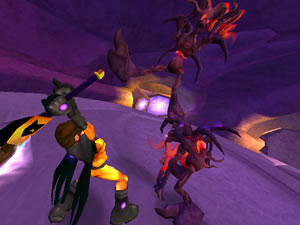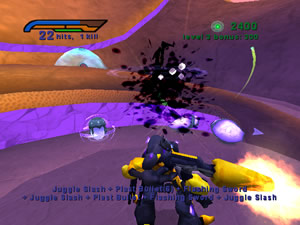A plast from the past.
If you had a bunch of cash and set out to make a video game, what would you do?
Would you listen to your demented cousins at Game Revolution and focus on deep,
open-ended, sophisticated gameplay? Or would you tell us to get bent, call up
your dad’s producer friend at MTV and whip out Road Rules Racing?
If you were cool, you’d do the former; if you were smart, you’d start working
on a proprietary Winnebago physics engine. But either way, you probably wouldn’t
come up with a unique sci-fi universe and get to work on an unbelievably linear,
level-based third-person action game…which is exactly what you get in Alter
Echo. Though the game has its moments, there’s very little here to
keep you coming back for more, and barely enough to keep you playing in the
first place.
Alter
Echo drops you into the year 2850, where the big resource is called
Multiplast. You’re Nevin, a Shaper with the ability to tweak the Plast into
weird forms. It seems that a rogue Shaper named Paavo has gone haywire at the
planet Proteus, the only place in the universe where one can find Plast, and
has developed an uber form of Plast called EchoPlast. Sure enough, you and two
comrades are sent in to investigate. I know that video game plots are rarely
the stuff of novels, but this one is so confusing and rickety that it would
really only appeal to the kids of the guy who invented Play
Doh.
And luckily, that’s not the point of Alter Echo. The point,
as it were, is to kick ass and take names, even if those names are as stupid
as “Nevin.”
The world of Proteus is one of rounded edges and amorphous blobs, which could
actually be cool to explore, but you never get the chance. Alter Echo‘s
single-player story (there is no multiplayer) is told through totally linear
levels, which take about 10 minutes on average to complete. You cannot stray
from the very obvious paths whatsoever; it’s just a straight shot from end to
end, after which you’re yanked out to a load screen. It’s quite jarring and
really gets in the way of establishing any sort of immersive world. It’s a shame,
too, since the developers at Outrageous Games went to the trouble of creating
a brand new universe in the first place.
But while you’re there, you certainly kick the aforementioned ass. You’re
equipped with a Polysuit that has the ability to morph into three different
forms on the fly: the human Sword form, the robotic Gun form, and the cat/dog
Stealth form. You can toggle between the three at the flick of a button, and
each has its own set of attacks, defenses, weapon upgrades and special abilities.
This surprising depth helps Alter Echo tremendously. Though
there aren’t many upgrades, at least there are some, and at least you
have to spend “Plasm” to buy them. It’s no Baldur’s
Gate, but for a fairly typical action game, it’s a nice addition.
The bulk of the gameplay involves running from one end of the level to the
other while killing all the baddies that spawn in, usually by way of little
generators called Trap Nodes. The enemies cover a range of types, from the standard
Plastid drones to the ranged Gunners to the burly Titans. As you progress they
get tougher, and each is immune to one (or more) of your suit forms. Things
get pretty wily as you whack at one guy with your sword, then have to quickly
shift to your Gun form to shoot another guy, then shift into Stealth form to
pounce on another guy’s head – all while getting pegged mercilessly.
 To
To
help you when you’re outnumbered, Alter Echo offers a pretty
interesting new gameplay concept called Time Dilation. By collecting enough
orange sparkly bits, you can enter TD mode and wipe out a bunch of enemies in
one shot.
Time Dilation works like any basic rhythm game: you control an arrow that
you move around the screen in time with an increasing tempo, aided by both a
little meter at the bottom of the screen and a big rhythmic flash across the
middle of the screen. Portraits of the enemies dot the ‘map’, and as you move
your arrow around you must hit each portrait if you want to do damage. You’re
rewarded for staying power; the longer you keep time before either screwing
up or landing on all the enemies, the more damage you’ll do. At the end, the
game switches to a fancy Final Fantasy-esque sequence of you
wailing on the bad guys, after which you’re tossed back into the fray.
The whole Time Dilation concept is really just a modernized, user-controlled version of the smart bomb. It’s not as big of a deal as the developers would have you think, but kudos to them for trying to do something new, and for the most part succeeding.
Unfortunately, those kudos do not extend to the unbelievably repetitive nature
of Alter Echo. Level after level has you beating up bad guys,
using some “Synch Nodes” (which play just like the Time Dilation) to open up
doors, beating up more guys, then exiting. You do this over and over again,
and the whole time you’re sort of wondering why.
While the action in Alter Echo looks and feels fine thanks
to a steady framerate across both platforms, the future is apparently filled
with blue, purple and yellow bubbly shapes. It’s the gaming equivalent of what
you see after staring at a light for too long. The enemies look fine at first,
but after the 50th time you fight ’em, you don’t care anymore. Really the best
effect in the game is the seamless form morphing, which is smooth and neat. The character models aren’t thrilling, unless you’re into giant heads on small
bodies. Close-ups of faces during the plethora of talky cut-scenes demonstrate
some of the most unconvincing lip-synching I’ve seen since Swordsman
With An Umbrella.
But things get worse. The user-controlled camera is frisky at best and they
forgot to include a ‘quick locate’ button to re-center it when it gets screwy,
which is quite often. Half of the time you’re whacking at guys you don’t see.
Not that you’d want to listen to the weak script and weaker voice-acting, filled with unfunny irreverence and awkward tonality. The music is decent, at least, if you’re into thumping bass and whatnot.
What we’re left with is a good stab at innovation marred by hopelessly dated
level design and short (you can beat it in 10 hours), repetitive gameplay. You
get the feeling that Alter Echo could have been much more;
had they focused more on the suit upgrades and Time Dilation and went with a
solid, seamless world to explore, this could have been a good game. Rather,
Alter Echo isn’t merely a waste of developer money: it’s a
waste of your money, unless you have a gold rental card.

-
Three cool forms
-
Some limited depth
-
Some awful level design
-
Brutally linear
-
Repetitive gameplay
-
Mediocre delivery
-
Short, no replay value







